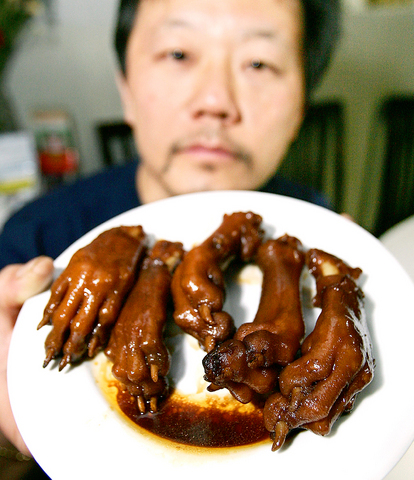The Year of the Dog dawns on Sunday, but it brings mixed fortunes for man's best friend in a culture where people increasingly keep canines as pets while others condemn them to the cooking pot.
Once banned as a bourgeois luxury, pet ownership is becoming big business in China and, with one in every nine Chinese now owning a dog, they are beginning to enjoy the status pampered pooches have in some other parts of Asia.
Owners from Taipei to Tokyo spend thousands of dollars on their furry friends at grooming parlors which offer pedicures, acupuncture and massages along with a more usual coat trim.

PHOTO: AFP
Dogs there even have their own cafes, funeral homes and schools.
But they remain the lucky ones.
Canines are still commonly eaten as a delicacy in China and Chinese communities around Asia. Others are skinned alive for their fur to make trimming for clothing and fashion accessories.
Up to 10 million dogs are slaughtered every year in China, many killed slowly and cruelly to supposedly enhance the meat's flavor, according to Jill Robinson, founder and chief executive officer of the Hong Kong-based Animals Asia Foundation.
"People's attitudes have been changing over the past 15 years, but China is still the world's biggest consumer of dogs," Robinson said.
In northern China large dogs such as St Bernards and Tibetan Mastiffs were being cross-bred with local dogs to create fast-growing, large meat dogs that could be slaughtered as young as four months old, she said.
Even in cosmopolitan cities such as Beijing, dog restaurants remain part of the cityscape, most popular in winter as dog meat is supposed to keep you warm and tastes like beef according to those who have tried.
Skinning of live dogs for fur also takes place in China, mainly because it helps preserve the skin of the canines, according to animal activists.
Yu Fachang, an official in charge of market order at the State Administration of Industry and Commerce, this month confirmed the practice was ongoing.
"Currently, in some parts of the country, in some animal markets, animals are skinned alive, like cats and dogs. It's individual cases taking place at individual markets," he said.
"We still don't have any laws on the slaughtering of ordinary animals such as cats and dogs, as they do not belong into the category of traditional food," he said, adding that regulation was being prepared.
Rock star Paul McCartney said last November that he would never perform in China after watching a disturbing secret video of dogs and cats in a market being slaughtered for fur.
The video, from the German branch of the animal rights group PETA, shows caged dogs in wire cages being hurled from the top deck of a converted double-decker bus onto a concrete pavement at a market in southern China.

DISASTER: The Bangladesh Meteorological Department recorded a magnitude 5.7 and tremors reached as far as Kolkata, India, more than 300km away from the epicenter A powerful earthquake struck Bangladesh yesterday outside the crowded capital, Dhaka, killing at least five people and injuring about a hundred, the government said. The magnitude 5.5 quake struck at 10:38am near Narsingdi, Bangladesh, about 33km from Dhaka, the US Geological Survey (USGS) said. The earthquake sparked fear and chaos with many in the Muslim-majority nation of 170 million people at home on their day off. AFP reporters in Dhaka said they saw people weeping in the streets while others appeared shocked. Bangladesh Interim Leader Muhammad Yunus expressed his “deep shock and sorrow over the news of casualties in various districts.” At least five people,

LEFT AND RIGHT: Battling anti-incumbent, anticommunist sentiment, Jeanette Jara had a precarious lead over far-right Jose Antonio Kast as they look to the Dec. 14 run Leftist candidate Jeannette Jara and far-right leader Jose Antonio Kast are to go head-to-head in Chile’s presidential runoff after topping Sunday’s first round of voting in an election dominated by fears of violent crime. With 99 percent of the results counted, Jara, a 51-year-old communist running on behalf of an eight-party coalition, won 26.85 percent, compared with 23.93 percent for Kast, the Servel electoral service said. The election was dominated by deep concern over a surge in murders, kidnappings and extortion widely blamed on foreign crime gangs. Kast, 59, has vowed to build walls, fences and trenches along Chile’s border with Bolivia to

DEATH SENTENCE: The ousted leader said she was willing to attend a fresh trial outside Bangladesh where the ruling would not be a ‘foregone conclusion’ Bangladesh’s fugitive former prime minister Sheikh Hasina yesterday called the guilty verdict and death sentence in her crimes against humanity trial “biased and politically motivated.” Hasina, 78, defied court orders that she return from India to attend her trial about whether she ordered a deadly crackdown against the student-led uprising that ousted her. She was found guilty and sentenced to death earlier yesterday. “The verdicts announced against me have been made by a rigged tribunal established and presided over by an unelected government with no democratic mandate,” Hasina said in a statement issued from hiding in India. “They are biased and politically motivated,” she

It is one of the world’s most famous unsolved codes whose answer could sell for a fortune — but two US friends say they have already found the secret hidden by Kryptos. The S-shaped copper sculpture has baffled cryptography enthusiasts since its 1990 installation on the grounds of the CIA headquarters in Virginia, with three of its four messages deciphered so far. Yet K4, the final passage, has kept codebreakers scratching their heads. Sculptor Jim Sanborn, 80, has been so overwhelmed by guesses that he started charging US$50 for each response. Sanborn in August announced he would auction the 97-character solution to K4